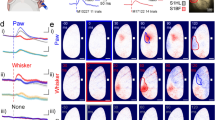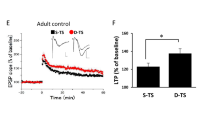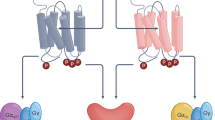Abstract
THE muscarinic excitatory action of acetylcholine on central and peripheral neurones has been suggested to involve a reduction in membrane conductance for potassium ions1,2. This proposal was supported by observations that 2,4-dinitrophenol (DNP) could specifically suppress the excitation by acetylcholine of cerebral cortical neurones in the cat without affecting the excitatory action of L-glutamate, and that the hyperpolarization of these neurones by DNP involved an increase in the membrane conductance for potassium ions3.
This is a preview of subscription content, access via your institution
Access options
Subscribe to this journal
Receive 51 print issues and online access
$199.00 per year
only $3.90 per issue
Buy this article
- Purchase on SpringerLink
- Instant access to full article PDF
Prices may be subject to local taxes which are calculated during checkout
Similar content being viewed by others
References
Godfraind, J. M., Krnjević, K., and Pumain, R., Nature, 208, 562 (1970).
Krnjević, K., Pumain, R., and Renaud, L., J. Physiol., 215, 247 (1971).
Godfraind, J. M., Kawamura, H., Krnjević, K., and Pumain, R., J. Physiol., 215, 199 (1971).
Curtis, D. R., and Ryall, R. W., Exp. Brain Res., 2, 66 (1966).
Author information
Authors and Affiliations
Rights and permissions
About this article
Cite this article
CURTIS, D., FELIX, D. Muscarinic Action of Acetylcholine. Nature 234, 355 (1971). https://doi.org/10.1038/234355a0
Received:
Issue date:
DOI: https://doi.org/10.1038/234355a0



